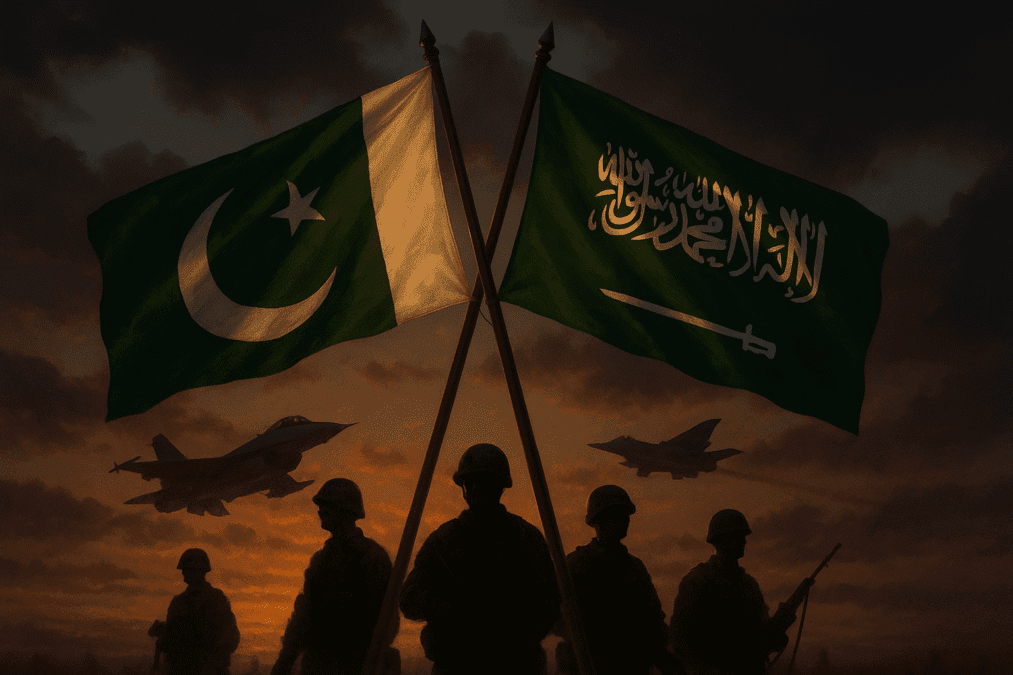On 17 September 2025, Pakistan and Saudi Arabia signed a far-reaching defence pact, officially named the Strategic Mutual Defense Agreement (SMDA). Widely referred to as the Pakistan-Saudi Arabia Defence Deal, the agreement declares that an attack on either country will be treated as an attack on both — a firm commitment that signals much more than symbolic solidarity.
Key Provisions & Significance of the Pakistan-Saudi Arabia Defence Deal
- Mutual Defence Clause: Any aggression against Pakistan is aggression against Saudi Arabia, and vice versa. This is the central pillar of the pact. AP News+2The Indian Express+2
- Deepening Security and Defence Cooperation: The agreement formalises cooperation that has been progressively growing for decades, including training, advisory support, joint exercises and possibly shared deterrence mechanisms. The Indian Express+2Al Jazeera+2
- Regional Context: The deal comes amid rising tension in the Middle East, especially following air-strikes (notably Israel’s strike on Doha, Qatar) and concerns among Gulf Arab states about shifting global alliances and perceived threats. AP News+2Al Jazeera+2
Why This Matters
- Strategic Signaling: For Saudi Arabia, the pact is more than security insurance. It signals intent to diversify its alliances beyond just the traditional reliance on U.S. protection. Al Jazeera+2The Indian Express+2
- Pakistan’s Leveraging: Pakistan, a nuclear-armed state, secures heightened strategic backing at a time of economic challenges. It gives Islamabad a strong bargaining chip in international relations. The Indian Express+2The Times of Israel+2
- Regional Balance & Deterrence: Given the volatile environment in the Gulf, tensions with Iran, ongoing Israeli-Arab dynamics, and wider global uncertainty, this pact is a boost to deterrence capacity on both sides. Al Jazeera+2The Times of Israel+2

Reactions & Implications
- India: Officials in New Delhi have responded cautiously. Expressing awareness of the Pakistan-Saudi Arabia Defence Deal, India is reportedly studying its implications for national security and regional balance.
- Other Neighbors and Powers: The Pakistan-Saudi Arabia Defence Deal is being watched with interest (and concern) by Israel, Iran, and U.S. analysts. Particularly, how this might alter deterrence equations, influence diplomatic alignments, and reshape security pacts in the Muslim world.
Possible Challenges & Uncertainties
- Operational Details: While the broad strokes are clear, many specifics remain vague: What are the thresholds for invoking the mutual defence clause? To what extent will nuclear deterrence be formally integrated? The Indian Express+1
- Risk of Escalation: If one party is attacked, what degree of military support will be mobilised? Could this lead to cascading involvement in conflicts? Such pacts inherently carry that risk.
- Diplomatic Tightropes: Saudi Arabia has relationships with many countries, including India. The pact may test Riyadh’s ability to balance its new commitments with existing diplomatic ties. The Indian Express+2Al Jazeera+2
Conclusion
The Pakistan-Saudi defence deal is a landmark in both bilateral relations and regional geopolitics. It formalises mutual defence in a high-stakes context, reconfiguring strategic calculations in South Asia and the Middle East. For Pakistan, it is both a guarantee and a signal; for Saudi Arabia, a hedge and a manifestation of changing security priorities.
How this actually plays out will depend heavily on how both states operationalize the agreement, how other regional powers respond, and the shifting shape of global alliances.
“Pakistan-Saudi Arabia Pact: A Turning Point in Muslim World Security”
On September 17, 2025, Pakistan and Saudi Arabia signed a historic defence agreement that is being described as a turning point in the geopolitics of South Asia and the Middle East. Officially named the Strategic Mutual Defense Agreement (SMDA), the Pakistan-Saudi Arabia Defence Deal binds the two nations to respond jointly if either comes under external aggression. For Pakistan, this is a major boost to its regional stature; for Saudi Arabia, it is a move to diversify security guarantees amid shifting global alliances.
A Pact Rooted in History
Pakistan and Saudi Arabia share decades of defence cooperation. Pakistani military personnel have long trained Saudi forces, and Riyadh has historically provided financial assistance to Islamabad in times of economic difficulty. This new Pakistan-Saudi Arabia Defence Deal builds on that legacy, but unlike earlier cooperation, it formalizes commitments at the highest level. By stating that an attack on one is an attack on both, the pact elevates their relationship into a strategic alliance.
Key Highlights of the Deal
The most important clause of the Pakistan-Saudi Arabia Defehttp://paf.gov.pk dofollownce Deal is its mutual defence provision. This means if Saudi Arabia faces aggression, Pakistan is obliged to defend it — and vice versa. While the exact mechanisms remain undisclosed, experts suggest it could involve joint military planning, intelligence sharing, cyber defence, and possibly strategic deterrence cooperation.
Additionally, the agreement includes:
- Joint military exercises to improve interoperability between the armed forces.
- Advisory support from Pakistan’s military to Saudi Arabia’s armed forces.
- Technology transfer in areas like drones, counter-terrorism, and missile defence.
- Expanded naval coordination to secure vital shipping lanes in the Arabian Sea and the Gulf.
Regional Context: Why Now?
The timing of the Pakistan-Saudi Arabia Defence Deal is not coincidental. The Middle East is undergoing rapid transformations — from Israel’s growing military assertiveness to tensions with Iran and the uncertainty of U.S. security commitments in the Gulf. Saudi Arabia, long reliant on American protection, is looking to diversify its security architecture. Partnering with nuclear-armed Pakistan offers Riyadh both symbolic and practical reassurance.
For Pakistan, the Pakistan-Saudi Arabia Defence Deal comes at a moment of economic strain and heightened geopolitical competition. By aligning closely with Saudi Arabia, Islamabad not only secures a stronger defence partner but also ensures long-term financial and political support from one of the world’s wealthiest nations.
Implications for the Wider Region
This defence pact has wide-ranging consequences.
- India’s Calculations: India has reacted cautiously, but privately, officials in New Delhi are assessing how the Pakistan-Saudi Arabia Defence Deal changes the regional balance. Pakistan gaining deeper support from Riyadh could influence India’s strategic posture, especially given its strong ties with the Gulf states.
- Iran’s Concerns: Tehran may view this alliance as an attempt to counterbalance its influence in the region. With Saudi Arabia already locked in strategic competition with Iran, Pakistan’s formal backing could intensify existing rivalries.
- Israel and the West: Israel, which has been strengthening ties with Arab states, may see the Pakistan-Saudi Arabia Defence Deal as complicating its security calculus. Meanwhile, Western powers are closely watching how Saudi Arabia shifts from dependency on the U.S. to building diverse alliances.
Opportunities for Pakistan
Beyond security, Pakistan could gain several economic and diplomatic benefits:
- Increased Saudi investments in infrastructure, energy, and technology.
- Stronger diplomatic leverage in international forums such as the UN and OIC.
- Access to advanced defence technologies through Saudi-brokered partnerships.
This Pakistan-Saudi Arabia Defence Deal may also open doors for Pakistan to position itself as a key mediator in Middle Eastern conflicts, leveraging its role as both a Muslim-majority nuclear power and a close Saudi partner.
Risks and Challenges
Despite the optimism, challenges remain.
- Ambiguity in Implementation: The pact’s details are still unclear. How will it be triggered? Will nuclear deterrence be part of it?
- Escalation Risks: If Saudi Arabia is drawn into conflict with Iran or Israel, Pakistan could be compelled to join — potentially overextending its resources.
- Diplomatic Tightrope: Pakistan must balance this pact with its relations with other countries, including China, Turkey, and even India’s growing Gulf ties.
A Turning Point in Muslim World Politics
For many analysts, the Pakistan-Saudi Arabia Defence Deal is not just about security — it is about reshaping Muslim world leadership. By aligning closely, Pakistan and Saudi Arabia are signaling a vision of collective defence that could inspire similar frameworks with other Muslim countries. If expanded, this could emerge as a counterbalance to Western-led security blocs like NATO.
Conclusion
The Pakistan-Saudi Arabia Defence Deal is more than a military pact; it is a strategic declaration of solidarity. For Pakistan, it is an opportunity to elevate its global standing; for Saudi Arabia, it is a hedge against uncertainty. While the long-term implications remain to be seen, one thing is clear: this agreement will reshape the political, security, and economic landscape of the Middle East and South Asia for years to come.
Further Reading & Sources
- Al Jazeera: ‘Watershed’: How Saudi-Pakistan defence pact reshapes region’s geopolitics Al Jazeera
- Reuters: Saudi Arabia and nuclear-armed Pakistan sign mutual defense pact Reuters
- Indian Express: What it means for the two countries The Indian Express

